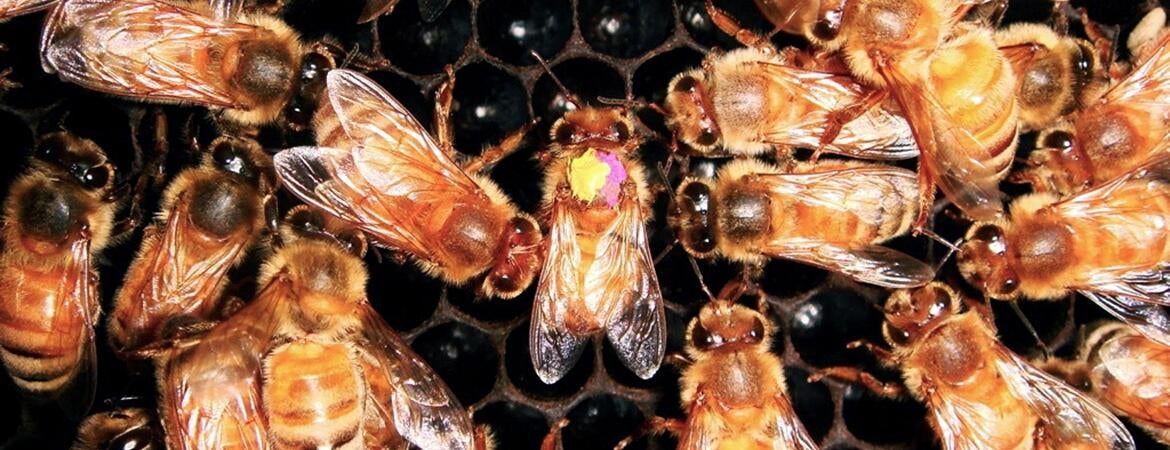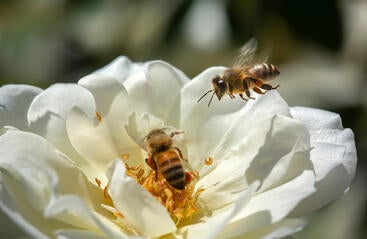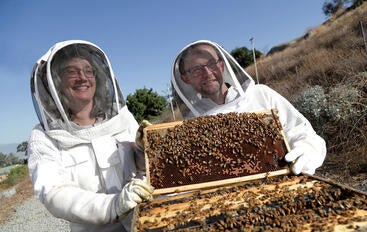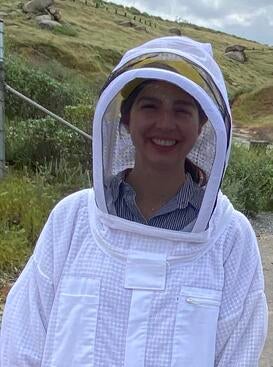
If you upset one bee, what determines whether the entire hive decides to avenge her grievance? A $1.2 million grant will support UC Riverside scientists in answering questions like these about how honeybees communicate.
Every third bite of food you eat has been pollinated by a bee. They are central to worldwide food production, but there have been an alarming number of die-offs recorded since 2006. One solution to this issue is the use of special survivor bees that are more resistant to pests and diseases that are killing managed honeybees.
Commonly found in Southern California, the survivor bees appear to be tolerant of deadly mites as well as extreme heat and drought. Genetically, they are the most diverse honeybees in the world, with a mix of African and European genes. However, they tend to behave with more defensiveness than the European-origin honeybees currently used for agriculture.
Defensive behaviors can include bumping beekeeper veils, chasing, or stinging entities perceived as threats. To breed these behaviors out of the bees, scientists need to know what triggers them.
“If we understand what stresses out the survivor bees, that can inform different beekeeping strategies, as well as a breeding program to help unravel the defensiveness,” said UCR entomologist Barbara Baer-Imhoof, who is co-leading this program alongside UCR colleagues, entomologist Boris Baer and insect neuroscientist Ysabel Giraldo.
Baer and Baer-Imhoof run CIBER, the Center for Integrative Bee Research at UCR, where they study stressors responsible for the decline in bee health, and work on solutions to those problems, including new tools for monitoring the health of bees in managed hives.
For this grant, the researchers will determine how environmental threats are perceived and processed by individual bees, and then eventually how they are communicated to other members of the hive. This communication chain is a fundamental but still unsolved challenge in science.
Another aspect to this grant from the W.M. Keck Foundation is learning whether scientists ought to reconsider how they view bee societies. In addition to inter-bee communication, the project will ascertain how honeybees transmit information to subsequent generations of progeny, beyond the lifespan of any one generation.
Because hives can retain information, the researchers argue there should be a paradigm shift in the way bees are studied. “The fact that they are able to do this can be considered a cultural achievement,” said Baer.
Like human societies, there is a lot of variation amongst individual members.
“Some bees have different personalities. They’re not like little robots that give the same predictable response to every smell or situation. Why? That’s part of what we want to know,” Baer said.
As the bees employ a combination of vibrations, chemicals, smells, sounds, and movements to communicate, Giraldo’s laboratory will use genetic tools to learn about the brain cells controlling these interactions.
“The tools we have are powerful enough to allow us to understand the responses of individual brain regions in real time, and give us a high-resolution picture of what’s happening, Giraldo said.
The bee has only a million brain cells, which is not much compared to mice, which have an average of 70 million neurons. However, bees can solve math equations and dance for one another.
“They can do complicated things,” Baer said. “They must be extremely efficient on an individual level to use the available brain power for complex tasks like these.”
Based in Los Angeles, the W. M. Keck Foundation was established in 1954 by the late W. M. Keck, founder of the Superior Oil Company. The foundation’s grant-making is focused primarily on pioneering efforts in the areas of medical research and science and engineering. The foundation also supports undergraduate education and maintains a Southern California Grant Program that provides support for the Los Angeles community, with a special emphasis on children and youth. For more information, visit www.wmkeck.org
“On behalf of the UCR community, I extend our sincere thanks to the W.M. Keck Foundation,” said Chancellor Kim Wilcox. “Funding from the foundation will support innovative projects that aim to develop new strategies for understanding and protecting bees. These efforts are crucial as pollinators play a key role in the health of ecosystems and the production of food worldwide.”
On a UCR entomology podcast published this week, Boris Baer and Barbara Baer-Imhoof discuss killer bees and the important part they're playing in the agriculture of the future. Listen here.
(Cover image: James Nieh/UCSD)






